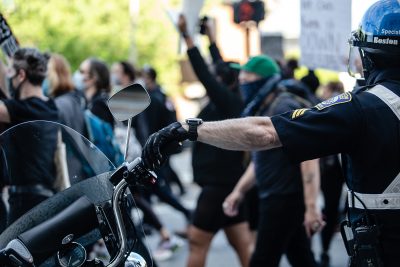Massachusetts is one of four states in the U.S. without a certification or decertification process for its police force. That may soon change.

In response to police brutality protests across the nation, Gov. Charlie Baker proposed a bill Wednesday requiring police officers to get licensed and recertified every three years.
The certification process will standardize police training, regulate programs and set expectations for recertification. Baker asked legislatures to take the bill into consideration before the session ends on July 31.
The bill, entitled “An Act to Improve Police Officer Standards and Accountability and to Improve Training,” will also allow out-of-state police departments or employers to access police officers’ discipline, conduct and training records.
The bill would prevent those who abuse their authority from being hired elsewhere and starting over, as their records will follow them.
The creation of the Police Officer Standards and Accreditation Committee is also a part of the proposed bill. This committee will create a standardized background check for police officers looking to move to a new department.
POSA will also certify all law enforcement officials, including those not employed by the state — such as university campus police — and create a database of certified officers for current and future employers.
The committee would be made up of police officers appointed by the attorney general and civilians appointed by the governor. At least half of the committee must consist of people of color.
The legislation also includes incentives for police officers to receive more advanced education and training.
Having collaborated on it with the Massachusetts Black Latino Legislative Caucus for more than a year, Baker said during a press briefing the bill will increase police accountability and make law enforcement practices more transparent.
James Machado, executive director of the Massachusetts Police Association, said he supports the bill.
“We are always proponents of advancement and the professionalization of law enforcement,” Machado said.
John Hugo is president of Super Happy Fun America, which organized Boston’s Straight Pride Parade last year and a Blue Lives Matter protest in February. Hugo said that while he thinks defunding the police would be a grave mistake, increased police training would benefit the city.
“A city without police is going to descend into anarchy,” Hugo said. “We have to have well-trained police and certainly they could always have better training.”
Dic Donohue, associate policy researcher at RAND Corporation and a former Transit Police officer, said this is only one component of a broader police reform effort.
“[The legislation] does take some certainly needed steps to get Massachusetts to a level where officers can be certified and decertified and to provide incentives for training in the issues that were identified in the bill,” Donohue said. “It also allows language for other potential training areas that might help strengthen the bond between the community and police.”
Although he is confident the public will have little trouble accepting general concepts of certification and decertification for police, Donohue said the legislation could generate some contention in other areas.
“Some of the pushback I can see [is about] including civilians on the panels, who might not understand what it’s like to be an officer,” Donohue said, “or some of the case law behind police use of force.”
Massachusetts Sen. William Brownsberger of the Second Suffolk and Middlesex District said while he believes passing the bill will help combat police brutality, it does not necessarily tackle systemic racism itself.
“The bill is about police conduct, which ties into racism,” Brownsberger said, “but it’s really strictly about police conduct regardless of whether the police officer’s Black or white or whether the person on the street is Black or white.”






















































































































